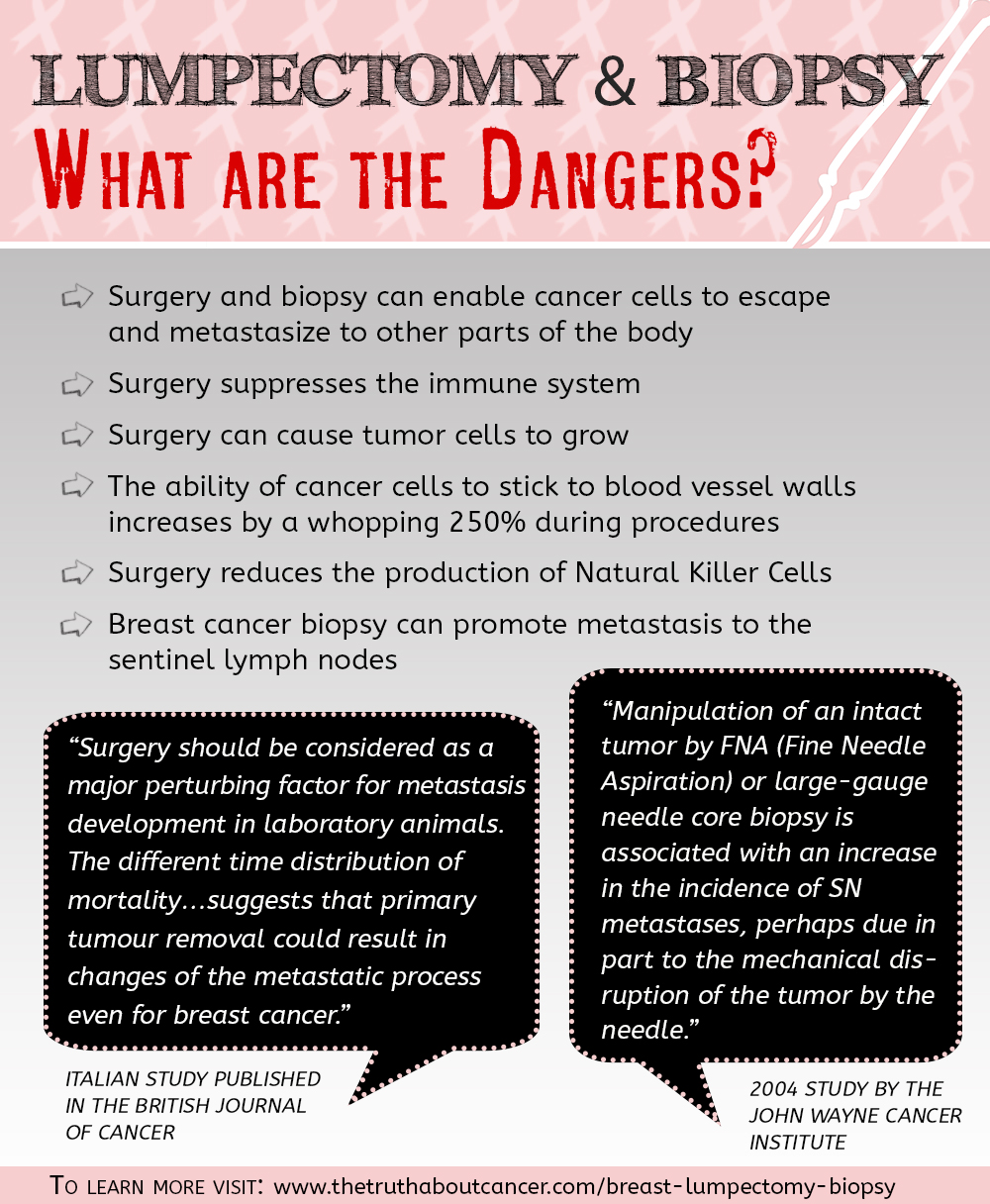The Dangers of (and Alternatives to) Breast Lumpectomy and Biopsy
Biopsy
and breast lumpectomy are used in different stages of the conventional
breast cancer journey. However, these two procedures have a lot more in
common than you may think. Both are considered “breast-conserving” or
“breast preservation” procedures, and both come with some pretty
dangerous side effects as well.
When deciding to do either one, in the end you need to do what you feel is best for you and your health. Arming yourself with the right information about biopsies and lumpectomies can help you make that decision with confidence and empowerment.
Then, if a cancer tumor is discovered, an oncologist may recommend that a lumpectomy be performed instead of a mastectomy in order to remove a cancerous tumor without removing the entire breast. A breast lumpectomy consists of the removal of the “lump” (i.e. the breast tumor) and usually some of the healthy tissue that surrounds the tumor as well. Often this is called a partial mastectomy.
You may be under the impression that surgery is a more natural way of dealing with cancer because it is a mechanical procedure that does not involve drugs (except for pain medication afterwards). However, just like mastectomy, both biopsy and lumpectomy need to be considered as invasive surgeries that come with the same basic dangers as a major operation.
Any time there is interface with a cancer tumor in a surgical setting, including biopsy, the natural barriers that would normally keep the tumor contained to a particular area are breached. This could enable cancer cells to escape and metastasize to other parts of the body through the surgical margins. An Italian study on over 1,000 patients published in the British Journal of Cancer concluded that:
“Surgery should be considered as a major perturbing factor for metastasis development in laboratory animals. The different time distribution of mortality…suggests that primary tumour removal could result in changes of the metastatic process even for breast cancer.”
It
is understandable that some women want to know the specifics of their
breast cancer, which a biopsy may be able to provide. However, the
opinion of many experts is that “cancer is cancer;” the root cause is
basically the same no matter what form of cancer you have been diagnosed
with.
In terms of the natural treatment protocols you may deploy in healing cancer, the specifics of your form of breast cancer may not matter. This is because the “herbal chemo” supplementation protocols, detoxing methods, and changes in diet and lifestyle and other modalities will, in large part, be the same across the board.
Alternatives to biopsy DO EXIST and can present you with additional information about your cancer with far less risk to your health. These may include the ONCOblot® test and thermography screening, among others. In addition, the RGCC Greece blood test can give you insights as to specific genetic and stem cell markers.

When deciding to do either one, in the end you need to do what you feel is best for you and your health. Arming yourself with the right information about biopsies and lumpectomies can help you make that decision with confidence and empowerment.
Breast Lumpectomy and Biopsy Both Carry the Risk of Spreading Cancer Tumor Cells
In a conventional medical setting, it is commonplace for a doctor to recommend a biopsy in order to gather more information after abnormalities are found in the breast area. A biopsy consists of the insertion of a needle into the area in question in order to “remove a piece of tissue or a sample of cells from the body so that it can be analyzed in a laboratory” (according to the Mayo Clinic).Then, if a cancer tumor is discovered, an oncologist may recommend that a lumpectomy be performed instead of a mastectomy in order to remove a cancerous tumor without removing the entire breast. A breast lumpectomy consists of the removal of the “lump” (i.e. the breast tumor) and usually some of the healthy tissue that surrounds the tumor as well. Often this is called a partial mastectomy.
You may be under the impression that surgery is a more natural way of dealing with cancer because it is a mechanical procedure that does not involve drugs (except for pain medication afterwards). However, just like mastectomy, both biopsy and lumpectomy need to be considered as invasive surgeries that come with the same basic dangers as a major operation.
Any time there is interface with a cancer tumor in a surgical setting, including biopsy, the natural barriers that would normally keep the tumor contained to a particular area are breached. This could enable cancer cells to escape and metastasize to other parts of the body through the surgical margins. An Italian study on over 1,000 patients published in the British Journal of Cancer concluded that:
“Surgery should be considered as a major perturbing factor for metastasis development in laboratory animals. The different time distribution of mortality…suggests that primary tumour removal could result in changes of the metastatic process even for breast cancer.”
Important Considerations Before Going Ahead With a Biopsy or Lumpectomy
Here are some other factors to consider regarding biopsy and lumpectomy:- Surgery, just like any other physical trauma, will induce immune suppression. It will also initiate an inflammatory response that could cause cancer cells to proliferate.
- Also as part of the trauma response, during surgery the body will secrete specific growth factors in an effort to quickly instigate healing. Unfortunately, this response can have the opposite effect when it comes to cancer since these same substances can also cause tumor cells to grow.
- Cancer cells are sticky: their surface acts very much like Velcro, enabling them to adhere to each other as well as to blood vessel walls. An experiment that mimicked cancer surgery conditions found that the ability of cancer cells to stick to blood vessel walls increased by a whopping 250% during procedures.
- Surgery reduces production of Natural Killer cells and stunts their activity. NK cells’ main job is to seek out invasive and harmful pathogens such as cancer cells and eat (i.e. destroy) them.
- A 2011 study published in the journal The Annals of Surgery found that surgery itself can cause the right environment for cancer to grow and spread, in part because of the shutdown of the immune system that occurs during surgery.
- Finally, there is an established link between investigative breast cancer biopsy and metastasis to the sentinel lymph nodes in particular. A 2004 study conducted by researchers at the John Wayne Cancer Institute, Saint John’s Health Center in Santa Monica, California, found that “manipulation of an intact tumor by FNA (Fine Needle Aspiration) or large-gauge needle core biopsy is associated with an increase in the incidence of SN metastases, perhaps due in part to the mechanical disruption of the tumor by the needle.”
 Is Biopsy Necessary?
Is Biopsy Necessary?
It
is understandable that some women want to know the specifics of their
breast cancer, which a biopsy may be able to provide. However, the
opinion of many experts is that “cancer is cancer;” the root cause is
basically the same no matter what form of cancer you have been diagnosed
with.In terms of the natural treatment protocols you may deploy in healing cancer, the specifics of your form of breast cancer may not matter. This is because the “herbal chemo” supplementation protocols, detoxing methods, and changes in diet and lifestyle and other modalities will, in large part, be the same across the board.
Alternatives to biopsy DO EXIST and can present you with additional information about your cancer with far less risk to your health. These may include the ONCOblot® test and thermography screening, among others. In addition, the RGCC Greece blood test can give you insights as to specific genetic and stem cell markers.
Actions to Boost Your Immune System and Help Your Body Heal After Surgery
If you have already had an invasive surgery such as a lumpectomy, mastectomy, or biopsy, here are some actions you can take NOW to help your body repair and keep your immune system strong:- Modified Citrus Pectin prevents cancer cells from sticking to the walls of blood vessels. Some studies say by up to 95%! Studies and experts recommend 14 grams of MCP be taken daily for a period of one year after any surgery (including a positive biopsy).
- Medicinal mushrooms, garlic, glutamine, and IP-6 (inositol hexaphosphate) all have the ability to boost Natural Killer Cell activity. In addition, some studies show that mistletoe extract taken before surgery can lessen the suppression of Natural Killer Cell activity.
- Genistein, milk thistle, EGCG in green tea (especially in matcha green tea), and curcumin have all been reported to help reduce vascular growth factors in metastatic cancer. In several studies, curcumin reduced the mass of tumors themselves by between 60 and 80%.
Please share this important information with friends and family. It could save someone’s life!

Article Summary
- Both breast biopsies and lumpectomies are considered “breast-conserving” or “breast preservation” procedures that come with some potentially dangerous side effects.
- According to the Mayo Clinic, a biopsy consists of the insertion of a needle into the area in question in order to “remove a piece of tissue or a sample of cells from the body so that it can be analyzed in a laboratory.”
- A breast lumpectomy consists of the removal of the “lump” (i.e. the breast tumor) and usually some of the healthy tissue that surrounds the tumor as well. Often this is called a partial mastectomy.
- Any time there is interface with a cancer tumor in a surgical setting (including biopsy), the natural barriers that would normally keep the tumor contained to a particular area are breached. This could enable cancer cells to escape and metastasize to other parts of the body.
- Surgery will induce immune suppression which can initiate an inflammatory response that could cause cancer cells to proliferate. It also reduces production of Natural Killer cells whose main job is to seek out invasive and harmful pathogens such as cancer cells and destroy them.
- Alternatives to biopsy DO EXIST and can present you with additional information about your cancer with far less risk to your health. These can include the ONCOblot® test, thermography screening, and the RGCC Greece blood test among others.
- If you’ve already had invasive surgery
such as a lumpectomy, mastectomy, or biopsy, here are some foods and
supplements you might consider to help your body repair and keep your
immune system strong:
- Modified Citrus Pectin
- Medicinal mushrooms, garlic, glutamine, and IP-6 (inositol hexaphosphate)
- Genistein, milk thistle, EGCG in green tea (especially in matcha green tea), and curcumin

No comments:
Post a Comment